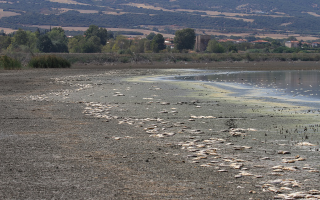Air pollution curbing life expectancy

The life expectancy of Greeks is being shortened by up to two years due to high atmospheric pollution levels, according to the findings of new international research presented at a two-day conference that concluded on Crete on Tuesday.
The findings were revealed by Dutch atmospheric chemist Jos Lelieveld, a professor at the Max Planck Institute and collaborator with the Cyprus Institute, at a conference in Iraklio that was organized by the Panhellenic Infrastructure for Atmospheric Composition and Climate Change (PANACEA), an initiative of Greek scientific and research groups that focus on atmospheric pollution and climate change.
Lelieveld’s research was based on a new scientific approach, which he and German cardiologist Thomas Munzel presented earlier this year, that found the estimated mortality caused by pollution is double what was originally thought due to its cardiological and respiratory repercussions.
The study focuses on tiny airborne pollution particles with a diameter of 2.5 micrometers or less (PM 2.5), whose toxicity it assesses along with their interaction with other pollutants.
According to researchers, these tiny particles are particularly dangerous as they are easily inhaled, with an estimated 8,000 people dying of atmospheric pollution in Greece per year, more than from smoking.
A study carried out over the summer by PANACEA, measuring pollution levels in six Greek cities, found relatively high concentrations of PM 2.5 particles, the conference heard.
The readings showed an average of 20 micrograms per cubic meter, according to Alexandros Papagiannis, an environmental physics professor, noting that concentrations in Athens were up to five times above the limit following a large wildfire in Evia in August.
The European Union’s limit for atmospheric pollution particles is 25 mg per cubic meter while that of the World Health Organization is 10 mg.





